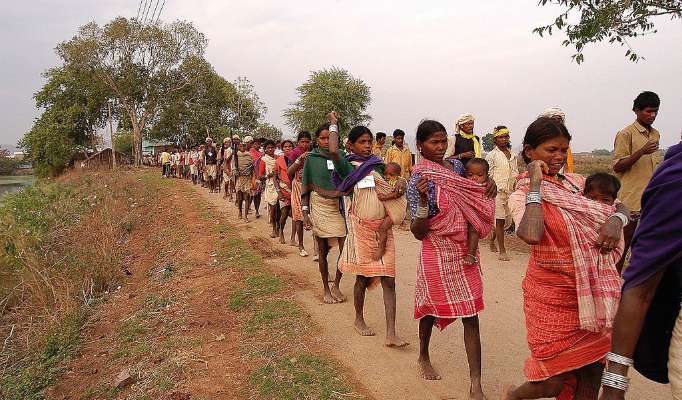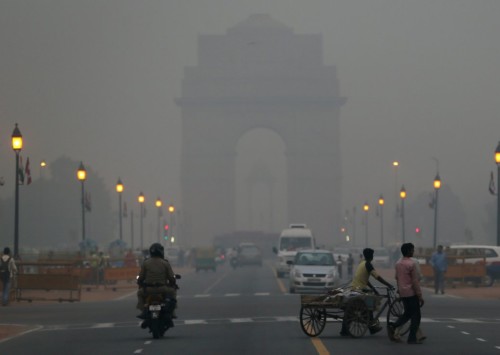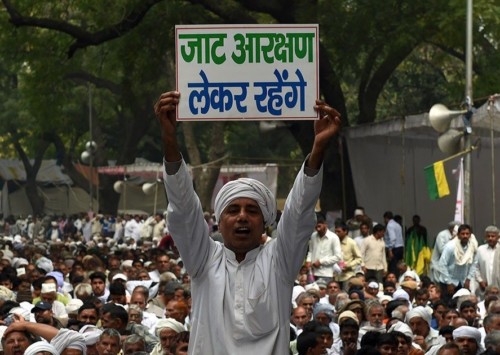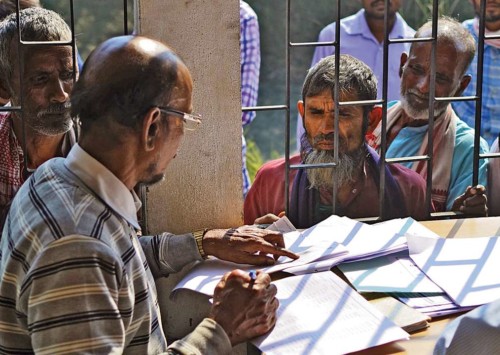Reprieve for over a million tribals today

The SC has also ordered the Forest Survey of India to use a satellite survey to record the positions of these communities before and after eviction.
India is home to thousands of tribes who have traditionally lived in the forests, across the entire nation. However, strict implementation of a 2006 law threatens to force them out of their homes.
A recent order by the Supreme Court of India to evict nearly 1.2 million tribal and other traditional forest dwellers, rejecting their ancient ownership claims on jungle land, in order to protect the wildlife of the country has brought the complex issue of human-animal conflict back to the forefront.
With increasing population, which often encroaches on preserved forests and leads to deforestation, there have been several incidents of wild animals getting killed by humans or vice versa. There are weekly reports of the big cats, notably leopards, panthers and even tigers being spotted in remote areas of many large cities.
Most of the encroachments have been relatively recent, over the past decade or two. The number of people living in the vicinity of forests, or sometimes even inside the forest areas, especially close to large cities, has increased manifold. It is in this context that the Indian government had brought in the Forest Rights Act in 2006, which allows traditional forest dwellers to file claims for land titles inside forest areas and as a community to use the forest commons. State governments were put in charge of verifying and approving the claims.
A tale of two Acts
The SC ruling is in a petition that was filed by Wildlife First, an NGO, questioning the constitutional validity of the Forests Rights Act. The petition claimed that it went against the grain of a body of existing legislation, including the Wildlife Protection Act, 1972 and the Forest (Conservation) Act of 1980 and that giving rights over forest land to forest dwellers or forest villages in protected wildlife sanctuaries would lead to the degradation of forests and loss of wildlife species. The petitioners say that human occupation of forested land has already resulted in deforestation. The petition asked the Court to ensure that at least those communities or people whose rights to the forest land had not been established or accepted by the respective state governments should be evicted urgently to save the forests from further degradation.
The SC was ruling on this petition and the judges agreed with the petitioner’s contention that households whose claims to forest land were rejected have to be evicted by July this year. As the rejections affect more than one million claims, depending on the size of the families it could translate to about 5-7 million people being evicted, making it the largest eviction in India since independence.
The SC has also ordered the Forest Survey of India to use a satellite survey to record the positions of these communities before and after eviction. Following the decision, thousands of indigenous people in eastern India protested against the court’s order. On February 25 protesters marched to the city of Behrampur in Odisha, with placards saying, “Stop eviction of tribal families and forest dwellers from their homeland.” Tribals across several states have called for a nationwide strike on March 5.
According to the 2011 census, the tribal population in the country was 104 million – almost 9 pc of the total 1.2 billion, making it the largest indigenous population in any country in the world, occupying 22 pc of India’s geographical terrain.
An unfair call?
The tribals’ plight has found sympathisers who believe that the Forest Rights Act is being misused by companies in order to have free access to exploit the forest resources. They allege that this eviction is being done at the behest of large mining, plantation and building companies whose operation in the forests has often brought them face to face with the tribes that have opposed the denudation and degradation of their traditional habitat by these companies. There have been dozens of examples of large mining and other projects being abandoned in face of severe opposition This is especially true in the Eastern states like Odisha, Jharkhand and Chhattisgarh that are rich in mineral resources.
A letter signed by various conservation groups, scientists, and environmentalists, including Greenpeace India, All India Union of Forest Working People, and All India Forum of Forest Movement, have said that the petition against the Act was a grave injustice to communities who have been slighted by the authorities before. “You would surely be aware that across the country a significant force that has stopped this resource loot is local communities fighting to protect their natural resources and habitats”, the letter says. However, the top court overruled this stance.
Political parties in a tight spot
With the 2019 general elections just around the corner, the eviction of tribals has put political parties in a tight spot. Congress president Rahul Gandhi and BJP party president Amit Shah had asked the chief ministers of all the Congress and BJP-ruled states to file a review petition in the case. Following this the Supreme Court has agreed to put a stay order, giving relief to more than one million forest dwellers and tribals in various states.
The Supreme Court has agreed to examine whether the due process under the Forest Rights Act was followed by the state governments in deciding the claims of the forest dwellers and the process of adjudicating appeals before final rejection. The bench headed by Justice Arun Mishra however clarified that the “forest land should not remain encroached by mighty and undeserving people”.
The central government has asked State governments to sanitise their data on rejected forest rights claims. “The states need to sanitise their data – they need to weed out duplicate rejections and corroborate if later a claim had been granted,” tribal affairs secretary Deepak Khandekar told an Indian media, while brushing off reports of 2.3 million of forest dwellers facing eviction.
In the meanwhile Human Rights Forum (HRF) has demanded that the Centre must bring in an ordinance to protect the ‘hapless population’.
Government violating forest tribal rights
A 2016 study by Community Forest Rights-Learning and Advocacy group (CFR-LA), a national network of organisations and individuals working on forest rights, estimated that the traditional forest dwellers should have rights over at least 40 million hectares forestland across the country.
However, according to data reports, in as many as 26 cases across 11 states show that forest land has been acquired by the government for development projects like mining and dams by forging consent of tribal people or by ignoring it.
About 1.8 million land titles have been given over 5.7 million hectares of forest land till October 2017, according to ministry of tribal affairs data. This is only about a seventh of the total forest land on which the tribes could potentially claim rights.
The government authorities have rejected more than 43 pc claims filed by the forest dwellers across India. As many as 79 pc claims were rejected in Uttar Pradesh, followed by 67 pc claims in West Bengal, 63 pc in Maharashtra and 59 pc in Madhya Pradesh. As per reports by IndiaSpend, most states do not explain why claims are rejected. Those that do, often cite as the most common reason the lack of documents to prove the claimant has been cultivating the land in question.












